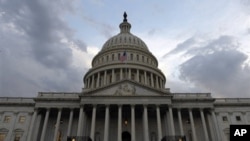The U.S. Senate is set to vote Monday on a short-term funding measure to keep the federal government running past midnight Friday, when current funding runs out. But in a conflict reminiscent of last April, Republicans in the House of Representatives and Democrats in the Senate are clashing over government spending in a showdown that threatens to shut down the government and dry up disaster relief funds.
For the third time this year, Republican and Democratic lawmakers are locked in a high-stakes battle over what typically had been routine votes to authorize funding for the federal government or raise the national debt ceiling.
The Democratic-controlled Senate is set to vote on its own short-term spending measure, or continuing resolution, after the Senate rejected a spending bill passed by the Republican-controlled House late last week. Senate Democrats need 60 votes to advance their bill.
The House bill would have funded the federal government through November 18 and included $3.65 billion for domestic disaster relief for the Federal Emergency Management Agency, or FEMA.
Republican House Speaker John Boehner called on the Senate to pass the House bill.
"The House passed a common sense measure that would keep the government open and provide immediate disaster relief to refill the FEMA coffers," said Boehner. "And while we passed a responsible bill, it is time for the Senate to move the House passed bill."
But Senate Democrats say the House plan did not provide enough disaster aid. They also criticize a provision that would have cut $1.5 billion from government clean energy programs, saying the reductions would kill jobs at a time of high unemployment.
The Senate Democrats' spending bill requires no spending offsets, which they say would set a bad precedent for future disasters.
Jessica Brady of the Roll Call newspaper says the partisan wrangling over the government budget is not good for the country.
"It is never good to have a shutdown; it is certainly not good for FEMA to run out of money when there are so many victims of natural disasters out there," said Brady.
For the third time this year, a partial government shutdown is possible, if Congress cannot agree on a budget measure before Friday, September 30, the end of the U.S. government's fiscal year. The House is in recess this week, and Republican leaders say they do not plan to call representatives to Washington from their home districts.
It is unclear how the House and Senate can resolve the impasse. But analysts say the conflict is unlikely to improve Congress' approval rating with the American public, which surveys show is at an all-time low of about 12 percent.
US Government Shutdown, Disaster Relief Threatened by Congressional Fight
- By Cindy Saine




